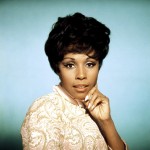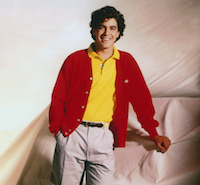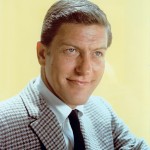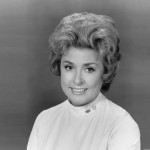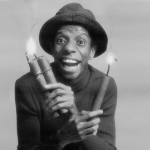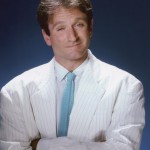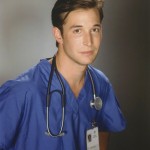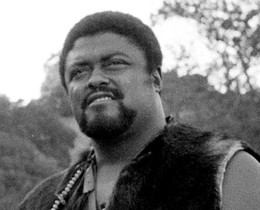 Before actor Roosevelt “Rosey” Grier delighted us as a regular cast member on Fess Parker’s popular Western, “Daniel Boone,” he was a professional football player and a one-time looming member of the Fearsome Foursome, a defensive line for the Los Angeles Rams.
Before actor Roosevelt “Rosey” Grier delighted us as a regular cast member on Fess Parker’s popular Western, “Daniel Boone,” he was a professional football player and a one-time looming member of the Fearsome Foursome, a defensive line for the Los Angeles Rams.
But his huge physical stature and strength belie a gentle man who believes, above all else, that non-violent reaction to injustice is key. Surprisingly, Grier saw this principle in action on the set of the 1960s Western, “Daniel Boone.”
In one script, Grier and Parker track down Grier’s mother, actress Ethel Waters, who is still living in slavery. In the show, the duo finds Grier’s mother, but she’s gravely ill. Grier’s character becomes physically upset that his mother was never able to enjoy freedom. In the episode, Grier begins to act out his anger, turning over a wagon and other violent actions. The production team, led by Fess Parker, decided to cut the violence because they feared that it might be replicated off-screen.
“They cut [the overturning of the wagon] out because they didn’t want to show violence. They wanted to show a man who was crying because he lost his mom, but they didn’t want to show violence because violence is very provocative in terms of other people going through situations and feeling they have been wronged,” Grier says.
Rosey Grier’s Connection to the Kennedy Family
Grier’s steadfast commitment to non-violence helped him keep a cool head in the midst of a terrible national tragedy. In 1968, Grier was working as a bodyguard for Ethel Kennedy on the night Senator Robert Kennedy was shot and killed by a lone gunman, Sirhan Sirhan. Grier and several others reacted to the sounds of gun shots and subdued the shooter, but Grier also had to protect Sirhan Sirhan from an angry crowd bent on killing him.
“Bobby [Kennedy] was down. They couldn’t help him … and so they came to get after [Sirhan Sirhan], and they started to pummel him … and I just fought them off because I was not going to allow [them] to commit a murder on this man, and so I protected him. … though he had hurt a friend that we all loved and the damage that was done. After we found out that [Kennedy’s injuries] were fatal, it made a big impact on our nation, on our world. Yet, we had an opportunity to say, ‘We do our thing in a different way. We don’t take some weapon and shoot people that we disagree with,’” he says.
Whenever Grier acted in any television program, whether it was a shoot-’em-up Western or gritty crime drama, he refused to carry a weapon of any kind. Writers and producers of the crime drama “Kojak” worked around Grier’s aversion whenever the larger-than-life actor guest starred on the show. “They developed a part for me where I could use all these karate and judo [moves], so I never had to pull out a weapon to shoot anyone,” Grier recalls. “I just didn’t want to carry a weapon because … I was always thinking about the kids, who, because of football, would know me. I didn’t want them to see me carrying a weapon.”






